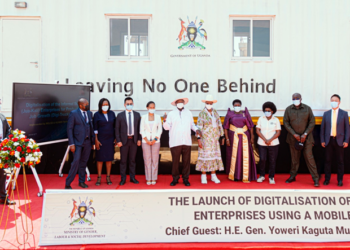Experts in Uganda’s rapidly developing entrepreneurial scene are making a strong case for company owners to adapt to the changing digital world. Ugandan entrepreneurs are at a critical turning point in the world’s history, when their capacity to quickly adopt new technologies will determine their competitive advantage in the global marketplace.
While at the fire site chart at Skyz Hotel in Naguru with organizational leaders on Wednesday one of the ICT experts who is now the CEO of MTN in South Sudan Ali Monzer revealed that the more than ever, navigating the complex routes to accomplishment in the contemporary corporate world requires taking a proactive approach to comprehending and utilizing digital dynamics.
He noted that the digital revolution has quickly changed how business is done, offering previously unheard-of opportunities as well as serious difficulties. “This change has enormous potential for advancement and creativity in Uganda, a country with a growing entrepreneurial spirit. But in order to take full advantage of these opportunities, business owners need to embrace digital dynamics completely rather than just recognize their importance..”
He added that whether it’s using data analytics to make well-informed decisions or utilizing e-commerce platforms to reach a larger audience, incorporating digital technologies into business strategy has become essential to remaining resilient and relevant in a constantly changing industry.
Peter Muramira, from Uganda Investment Authority, also informed ICT companies and leaders of organizations that building an atmosphere that attracts the right investors is essential to encouraging investment climate and raising the competitiveness of Uganda’s economy. “Technological developments must be smoothly integrated into all areas of our economy since competitiveness is essential to both economic expansion and employment creation. Technology integration makes data collection simple, which is essential for well-informed policymaking and efficient government development projects.”
“By carefully examining the data, we are able to identify the distinct production capacities of every district, giving investors important information that helps them better target their investments. The realization of our economic goals is contingent upon the widespread adoption of digitalization, which is the foundation of this strategic foresight,” he said.
He cautioned leaders and all small business holders in the private sector to embrace working with the government because currently, there is a push to gather data at the local level in order to provide the groundwork for evidence-based legislation and policy making. “Problems still exist, though, since a lot of Ugandans—especially those who run small businesses—apprehension about the tax ramifications of registering their businesses. Their unwillingness unintentionally prevents them from taking advantage of government incentives, which limits their ability to advance economically.”
The ICT Association of Uganda (ICTAU) Chief Executive Officer Gideon Nkurunungi also echoed that as the entrepreneurs in Uganda are striving to get on the digital train, and the various trends that are moving government is also a pivotal player to make sure that good policies are put in place to support all innovations that are come up.
“If we are speaking at the national level Uganda’s GDP is USD114bn and ICT only contributes USD9bn this is only 7 per cent that we contribute as ICT but in Nigeria’s economy ICT contributes17 percent. This means that it’s time for ICT to as well double the number. Therefore adoption of ICT is very key but not just adoption but understanding the data that is flowing and tell the story about what trends are available technologies to tap into such a pool of opportunities,” he said.
The COVID-19 epidemic has highlighted how critical it is for companies to quickly adjust to digital changes. Traditional company models have been disrupted by lockdowns and social distancing tactics; nevertheless, businesses that have strong digital infrastructures have fared better. To open up new business opportunities in Uganda, where the digital divide is still a major obstacle, entrepreneurs need to take proactive steps to close this gap.
Do you have a story in your community or an opinion to share with us: Email us at editorial@watchdoguganda.com













